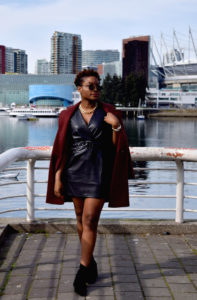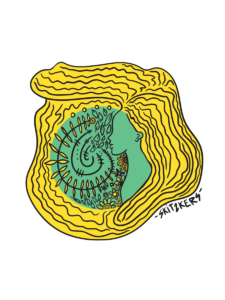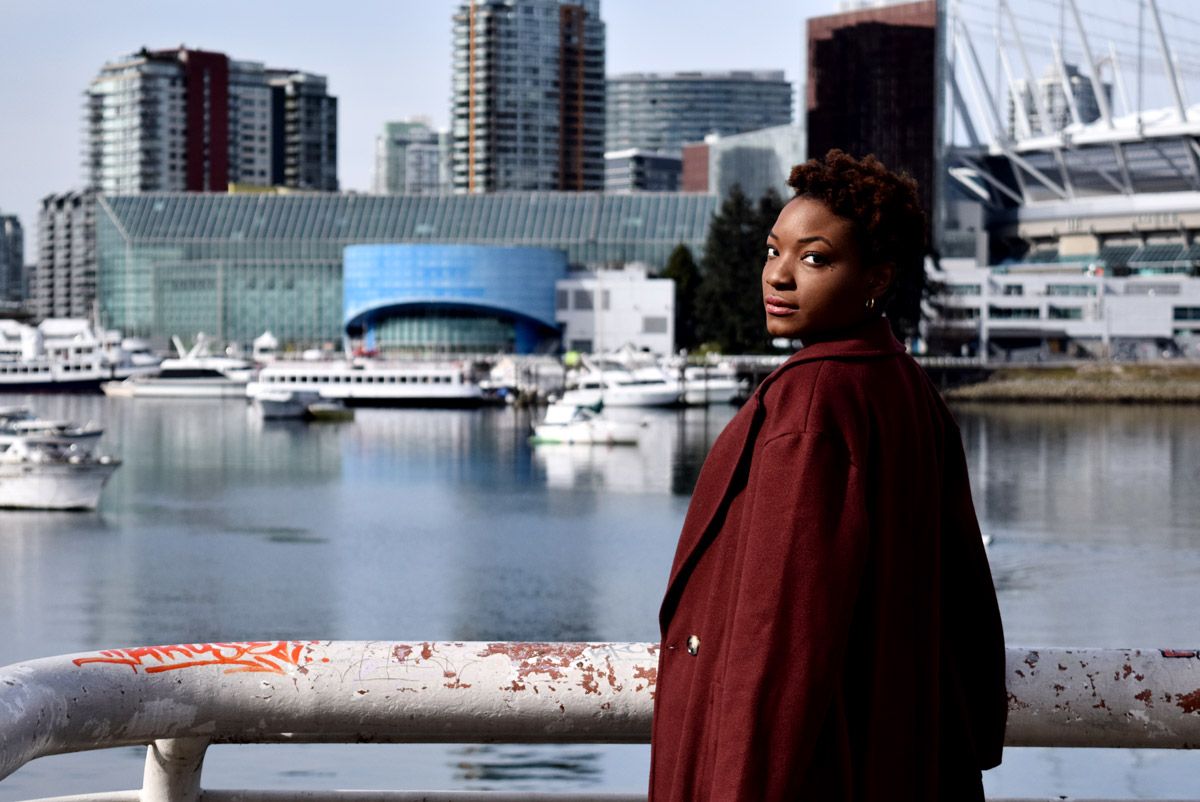If the quiet before the storm is prophetic, then the silence after its destruction is transformative. When Sadé Awele eventually accepted the reality of her situation, she saw this forced break on normalcy as an invitation to redefine its meaning.
Awele’s artistry is as reflective as it is spontaneous. In line with the tradition of soul music, the singer fully embraces improvisation as a foundational part of her recording process.
Remember when “Uptown Funk” was a thing? Or when the Whip and Nae Nae was still cool? Going through the catalogue of past radio earworms, it’s easy to lament at the short attention cycle of today’s popular music scene. Catchy tunes ascend to cultural fame for 15 minutes, and are then swept into obscurity to make way for the next round of one-hit wonders. But for the singer-songwriter Sadé Awele, timelessness is always the goal.

In her latest EP Time Love Journey, Awele’s intention is laid bare. With its ethereal harmonies and pulsating drums, the record’s sound is nothing short of perennial. The five songs brood an eclectic mix of introspect and celebration, dipping in and out of afro-soul, R&B, hip-hop, and a modicum of jazz. Her sound feels like Etta James meets Beyoncé, Marvin Gaye meets Fela Kuti. The building blocks of Awele’s sound are within her childhood home in Nigeria, where her music-loving father would play CDs of anything from gospel to Yoruba drumming.
Though it wasn’t always apparent music would become such a big part of her life. In fact, during her adolescence, it was not apparent that music would become a part of her life at all. “I was a nerd. I was a complete science nerd and I loved math,” Awele confessed over Zoom. Although she loved to perform, and her voice was always on pitch during family sing-togethers, Awele did not connect the dots until her father pointed out the connection to her. Her very first performance was for a school competition, and she remembers going “super extra” with every aspect — composing a song with her brother, having a choreographer to teach her dance moves, and even coordinating matching outfits with her backup singers. Clearly, a musical impulse already existed, it just needed a stage to shimmy out.

At the same time, coming from an immigrant background, her parents were paranoid of any full-time commitment to music. Although the industry today is finally beginning to invest in the Nigerian music scene, Awele explains there weren’t any clear trajectories back then. A career as a musician was hard to visualize — even more so to materialize. Her family was far more comfortable with a fallback pay-the-bills plan, and music as a side hustle. Awele is now a full-time civil engineer.
I was surprised to discover that on top of her performances, festivals, and recordings, Awele works a regular nine-to-five designing building structures. Her time management skills are well-worn muscles in her daily schedule; “so maybe during my lunch break I would work on something music-related, or post something on my social platforms,” Awele explained casually, a microwave beeping in the distant background. “After working hours I write music, or sometimes go to the studio with other people that I’m writing music with. My weekends are always busy; I’m always in the studio, I’m always performing.” In her own words, Awele is an “engineer by day, musician always.”

When the pandemic did its thing last March, she watched her inbox fill up with semi-apologetic emails announcing the cancellations of her booked performances. “2020 me was very upset. I was ex-treme-ly upset by the pandemic because I had like five or so festivals lined up, and they all canceled.”
If the quiet before the storm is prophetic, then the silence after its destruction is transformative. When Sadé Awele eventually accepted the reality of her situation, she saw this forced break on normalcy as an invitation to redefine its meaning. “I’m now finding that I have to go out of my way to really determine where I see myself in this pandemic,” she said. “I have to forge that path for myself, rather than waiting for the opportunities to come because the opportunities have changed. They don’t look the same as they used to.”
Turns out, Awele was able to release an entire EP in 2020. A good bulk of Time Love Journey was conceived under the contemplative mood of the paranormal year. Without having to physically visit her office or venues, she found more time to focus on the mini-album, which already had two songs down prior to the worldwide kerfuffle. She rented some equipment and recorded the rest in her storage space amidst cardboard boxes and the opportune times between her apartment neighbours’ workout schedule. When Awele celebrated the release on a livestream last October, she broke down crying. Indicative of its title, Time Love Journey is the culmination of the forces that drove Awele to this accomplishment, the zenith of Awele’s musical talents and personal growth.

In many aspects, Awele’s artistry is as reflective as it is spontaneous. In line with the tradition of soul music, the singer fully embraces improvisation as a foundational part of her recording process. The song “Take It Easy” almost feels like a live jam session, with horns and funky guitars slowly unfurling on top of Awele’s dreamy vocals. In a behind-the-scenes video of the recording, we see Awele and her collaborators in full creative swing, trying new harmonies and suggesting sounds for one another. While she knew how she wanted the song to feel, Awele was open to how it may change in finality. “Yes, I have this structure, but when it comes to the studio. I’m just going to let go, I’m just going to see where my emotions take me,” she said. “I think the first few times, everyone was sort of in their head, making sure that they’re getting their parts right. But once we were locked in by the fourth take or so, the energy changed in the room. It started to feel like, ‘okay, we’re really just creating this beautiful work of art at this point in time. Let’s just do it. Let’s just jam.'”
Instead of chasing the elusive hit song formula, or sticking to one particular genre, Awele’s music is a testament to the fluidity of her experiences. With every song in her repertoire comes another expansion of her musical toolkit, another jolt of clairvoyance on her life’s journey. While every musician craves an audience, Awele is careful to not let this craving contaminate her authenticity. Two years ago, she put out a single, “Dreams,” without any expectation of how it would land. It ended up on a Spotify editorial playlist, reached almost twenty-thousand streams, and suddenly, random people from the United States were using the tune to score their epic backflip videos. Awele believes “good music is good music regardless of whether it’s very mainstream or not.” Her intention is to vibe, to be in the zone. “If your music is good, and you’re true to yourself, and you’re writing from your heart, and you really work hard on that thing, it will resonate. It will always resonate with people. And it’ll have more meaning because you know that it was more of who you were.”

Earlier in February, Sadé Awele sang at the 2nd Floor Gastown venue on Water Street, inside what could only be described as a separated display wall. Behind the plexiglass, Awele freestyled a soulful rendition of “Put Your Record On” by Corinne Bailey Rae. Her voice envelopes the audience in viscous warmth, like some fossilized amber—a candid note of life, rendered timeless inside a gemstone.


